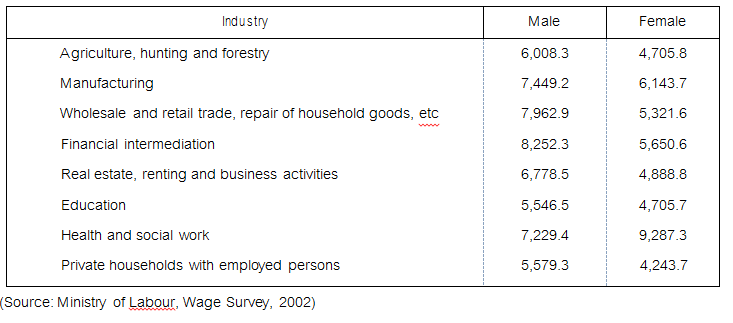Labour Force Discrimination in Thailand
Revision for “Labour Force Discrimination in Thailand” created on January 21, 2016 @ 09:22:50
|
Labour Force Discrimination in Thailand
|
|
<p>
 </p>
</p><div id="toc"><h2>Table of Contents</h2> <ul> <li class="toclevel-1"><a href="#w_background"><span class="tocnumber">1</span> <span class="toctext">Background</span></a></li> <li class="toclevel-1"><a href="#w_female-labour-force-participation-in-the-labour-market"><span class="tocnumber">2</span> <span class="toctext">Female Labour Force Participation in the Labour Market</span></a></li> <li class="toclevel-1"><a href="#w_female-wages-in-the-labour-market"><span class="tocnumber">3</span> <span class="toctext">Female Wages in the Labour Market</span></a></li> <li class="toclevel-1"><a href="#w_gender-disparity-in-thai-society"><span class="tocnumber">4</span> <span class="toctext">Gender disparity in Thai Society</span></a></li> <li class="toclevel-1"><a href="#w_conclusion"><span class="tocnumber">5</span> <span class="toctext">Conclusion</span></a></li> <li class="toclevel-1"><a href="#w_references"><span class="tocnumber">6</span> <span class="toctext">References</span></a></li> <li class="toclevel-1"><a href="#w_group-11"><span class="tocnumber">7</span> <span class="toctext">Group 11</span></a></li> </ul> </div><h2 id="w_background">Background</h2> <p>Thailand has had an evolution of women’s participation in the labour market over the past 10 years. Government policies have encouraged women to study and participate in the labour market. Between 85% – 90% of Thai women aged 22-65 are in the labour market, although the proportions for wages are considerably lower. (Mammen and Paxson 2000). </p> <h2 id="w_female-labour-force-participation-in-the-labour-market">Female Labour Force Participation in the Labour Market</h2> <p>Since the establishment of the National Economic and Social Development plan, Thailand became an industrial country. This led to a sharp decrease of the agricultural sector. Female employment in manufacturing and the service industry is on the rise. In the manufacturing sector, female employment is especially predominant in the textile and processed food industries. In the service sector, such as hotel work and tourism, there is also a high level of female employment. While there is a trend of an increasing female employment in the manufacturing and service sectors, agriculture still remains the largest sector for women’s employment. </p> <h2 id="w_female-wages-in-the-labour-market">Female Wages in the Labour Market</h2> <p>In Thai society, the class disparity is expanding: women who have studied abroad or graduated from renowned universities are having better opportunities in the labour market and obtin higher wages. </p><p>Table 1: Monthly Wage of Male and Female by Industry in 2002 </p><p>  </p><p>Table 1 shows wages in different industries. It indicates that in manufacturing, financial intermediation and the business sector, women tend to participate actively. However, the gender gap in wages still exists in most industries. In wholesale and retail trade, finance, real estate and business activities, as well as education, the gender gap is wide.
</p><p>Table 1 shows wages in different industries. It indicates that in manufacturing, financial intermediation and the business sector, women tend to participate actively. However, the gender gap in wages still exists in most industries. In wholesale and retail trade, finance, real estate and business activities, as well as education, the gender gap is wide.</p> <h2 id="w_gender-disparity-in-thai-society">Gender disparity in Thai Society</h2> <p>In Thai society gender discrimination is seen in various forms of labour force participation and employment conditions. The reasons for a gender gap may also differ by class. </p><p>In social groups with higher income and education level, women have more opportunities to choose the occupations than the lower-class groups. However, women are not promoting opportunities for top-level positions. This leads to gender disparity in wages and promotion. </p><p>The gender disparity may encourage many women to work in the ‘moonlighting’ sector, (meaning that they have a second job after normal business hours, in the evening or at night). These women usually get a low income and do not get promoted. This situation can lead to social issues and increase gender disparity in Thai society. </p> <h2 id="w_conclusion">Conclusion</h2> <p>While the economic activity rate of Thai women is high, the labour conditions differ depending on occupational groups and positions. Therefore, not all women take part in the labour market under favorable employment conditions. </p> <h2 id="w_references">References</h2> <ul><li>Culture of Thialnd : http://www.everyculture.com/Sa-Th/Thailand.html </li><li>Agriculture in Thailand : http://en.wikipedia.org/wiki/Agriculture_in_Thailand </li><li>Double burden : http://en.wikipedia.org/wiki/Double_burden </li><li>Gender inequality in Thailand : http://en.wikipedia.org/wiki/Gender_inequality_in_Thailand </li><li>National Statistical Office : The Wage Survey 2002,2005 : http://web.nso.go.th/eng/stat/lfs_e/lfse.htm </li><li>Promote gender equality and empower women : http://www.th.undp.org/content/thailand/en/home/mdgoverview/overview/mdg3/ </li><li>Moonlighting : http://en.wikipedia.org/wiki/Moonlighting </li></ul> <h2 id="w_group-11">Group 11</h2> <ul><li>Mr. Jirun boonpasuk 54148010347 </li><li>Mr. Voraprath bandhaya 54148010200 </li><li>Mr. Ausawin sukmanee 54148010384 </li><li>Mr. Supakit Keawkitsadang 541480010373 </li></ul> <p><i>from left to right</i> </p><p>10394059 </p><p> </p> |


